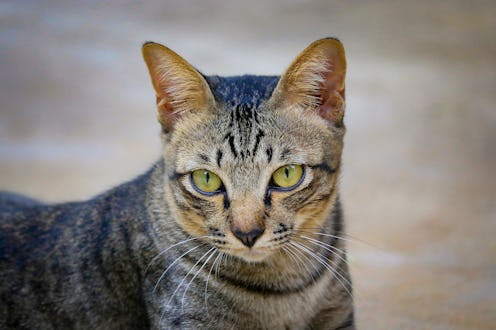
Here's one for the ages: Are cats afraid of bananas? Judging by the sheer number of YouTube videos involving felines leaping for their lives at the sight of this tropical fruit, the answer would appear to be a resounding yes (or meow, depending on who you ask). And according to some experts, there could be scientific explanations for why cats find bananas so unreasonably terrifying.
Before we delve into the weird world of melodramatic feline responses to food, though, let's start with a disclaimer: Don't scare your pets. OK, so that was more of an imperative. But seriously, while it might be comical to watch your "scaredy cat" turn into a contortionist at the sight of an errant fruit or vegetable, pulling this prank on your pet could actually be bad for their health — not to mention, it's not nice. It just isn't. The reality is there are many thing cats are seemingly irrationally afraid of, so the odds are good you'll inadvertently give your feline friend a startle at least once in your lifetime together. No need to go out of your way to do it!
Still, since this question is popping up after the great cucumber cat scaring craze of 2015, it's clear we still have much to learn about this unique phenomenon. Here are a few possible explanations for why bananas (and cucumbers, and zucchini, and just about any other odd object you might think about pranking your pet with) seem to freak out our kitty pals so much.
1. The Element Of Surprise
Considering most of the videos of cats being terrified of inanimate objects involve the object being placed behind or near the cat when they are unaware of it, it stands to reason the cats aren't scared of bananas — they're just scared. "I think that the reaction is due to the novelty and unexpectedness of finding an unusual object secretly placed...," Dr. Roger Mugford, a specialist in animal behavior, told the Telegraph during Cucumbergate 2015.
2. It's Not The Fruit; It's The Peel
Some pretty astute cat lovers on a recent Quora forum weighed in on the topic with a surprising suggestion: It's not that cats don't like bananas themselves (which are edible to them), but rather that cats don't like the smell of bananas. The theory goes that because ripening bananas give off ethyl acetate, their odor has overtones of acetone — a smell cats hate. But is there any credence to this notion? Apparently so! I came across several cat care websites that go so far as to suggest rubbing banana peels on furniture or in areas you don't want your cat to go near.
3. Fight-Or-Flight
Jill Goldman, a certified animal behaviorist in southern California, stressed to National Geographic that cats' fear of fruits and vegetables likely has a lot to do with the fear of potential threats. Unlike big cats in the wild, domestic cats face an abundance of larger predators every day. As such, their fight-of-flight response is essentially always on high alert — which explains why a banana or cucumber could scare the wits out of them if they thought it could be a threat, like a snake. "With a startle response, a cat will often try to get out of there as quickly as possible and then reassess from a distance," said Goldman.
4. Underlying Health Issues
When I wrote about cats' fear of cucumbers last year, Dr. Tony Buffington — a California-based feline expert and author of more than 100 scientific publications on the subject — alerted me to a study done on the effects of interstitial cystitis on the acoustic startle reflex in cats. Long story short? Cats who suffer from interstitial cystitis, or lower urinary tract disease, display a markedly higher startle reflex than healthy cats. So while this likely isn't the cause for every cat's banana phobia, it's certainly something to look into if your cat exhibits this kind of behavior.
Images: Getty Images (3)